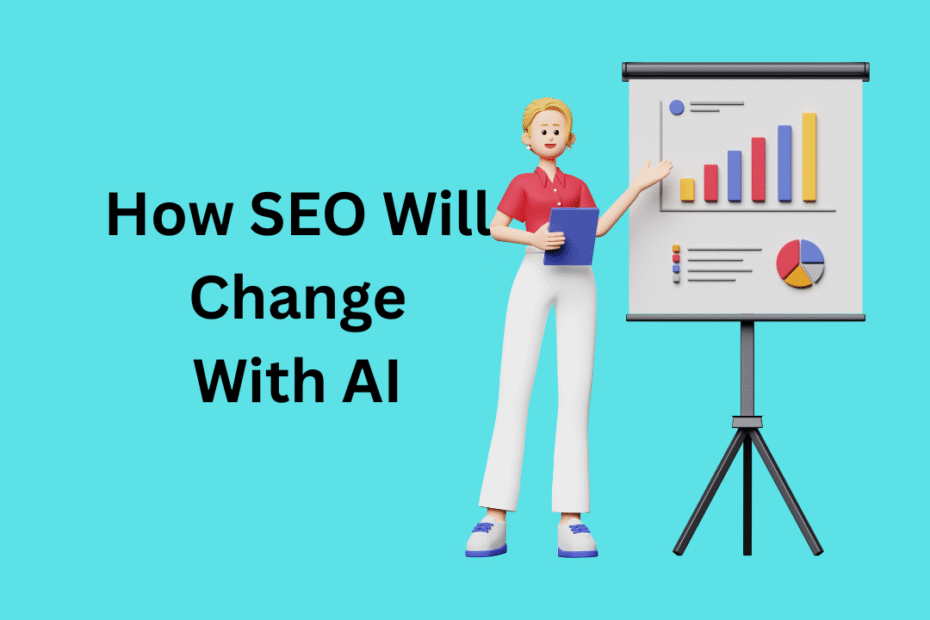Artificial intelligence isn’t just changing how we create content — it’s transforming the entire SEO landscape.
From Google’s Search Generative Experience (SGE) to AI powered keyword research and content optimization tools, the way sites are found and ranked is changing more rapidly than ever.
I’m hired as a writer of content and AI tools reviewer, and from there I see for myself what machine learning is doing to digital marketing . SEO is not only about keywords and backlinks now, it is about understanding user intent, semantic relevance, and how AI sees content quality.
In this post we dive into just how AI is transforming SEO, what it means for content creators and businesses, and how you can position your strategy to continue being found in the era of intelligent search.
AI Impact on SEO: AI Detection and Humanization
How AI Is Disrupting Search Engine Optimization
The robots are also changing how search engines parse and index content. Rather than simply matching keywords, search involves trying to figure out the context and the meaning, and what the user is actually looking for.
The implications of this shift are enormous for search engine optimization in all its aspects of algorithms and strategy. Search engines no longer purely rely on exact keywords.
80% of SEO professionals believe AI will reshape how they plan and execute SEO strategies within the next two years.
→ Source: Search Engine Journal, 2025 SEO Trends Survey
The Shift From Keywords to AI-Driven Search
AI models like BERT or Google’s RankBrain are models that look at the meaning behind queries. They receive natural language and context, hence results are often even relevant when the keywords are not matching exactly.
SEO needs to go beyond the practice of keyword stuffing. Instead I concentrate on answering directly the questions people are asking and writing like people actually speak and search. The conversational phrases, questioning, digging into topics is more important now.
These AI capabilities also monitor user behavior to determine or anticipate intent. This is beneficial in assisting search engines to determine what content is actually relevant to people and not just which pages have the correct words.
AI’s Influence on Search Algorithms
These days, A.I. is generating significant developments in search algorithms. Google, for example, employs machine learning to sort the best quality, relevance, and user experience of a page, rating them higher.
Google’s Search Generative Experience (SGE) is currently being tested in 120+ countries and is expected to reach full rollout by 2025.
→ Source: Google Search Central Blog, 2024
Today’s algorithms seek expertise, credibility and authority. The knowledge and value must be real and valuable, and search engines like AI will reward sites that truly have this in abundance, rather than overusing keywords.
AI can also be used to detect spam and low quality content much more quickly. The algorithms used by search engines eliminate the ability to game the system with SEO, which should drive marketers to instead make worthwhile things.
The Decline of Traditional SEO Tactics
Keyword stuffing, backlink overload, and meta tags only, etc… we all know this old-school SEO is no longer effective. AI-driven search catches content that is simply gaming the system, rather than providing value.
Some of the previously used rank-based strategies, that had no authentic power or utility do not seem to function as well now. Content must be clear, organized and also remain relevant over time.
Structured data and schema markup are now even more important. They help artificial intelligence better understand your content and increase the likelihood that you appear in rich snippets or knowledge panels.
Traditional SEO isn’t dead, but it is changing. Relevant in the sense of applying insights obtained through AI and thinking about trust in the longer term rather than as a short-term gain.
AI-Powered Search and User Intent
Search by the AI engine alters how machines interpret the user’s information desire. It is more than keywords, it is about behavior and patterns and it returns results that really match the query.
Understanding and Predicting Search Intent
AI-driven search aims to directly target what the searcher is actually seeking. Unlike word-for-word matching, A.I. reads the context and anticipates the type of information a user might be looking for.
70% of users say AI‑generated summaries in search results help them find answers faster.
→ Source: Statista, 2025 AI Search Behavior Report
Search intent can be considered as information, transactional or navigational. The AI determines which one by processing context and previous behavior. This allows businesses to generate content that actually provides answers to questions, rather than being filled with keywords.
45% of SEO experts predict AI will make keyword‑based strategies less important by 2026, shifting focus to topic clusters and user intent.
→ Source: Moz, 2024 SEO Industry Survey
Personalized and Conversational Search Experiences

Personalization is a big part of AI search. It is fast acting because it learns from what a user does and likes, and then provides output that matches the interest of the users.
Search engines also more easily process conversational queries now. AI understands natural language more fluently; people can ask followup or complex questions. This means that the content should read the way people speak, not just with static keywords you insert.
Voice Search and Natural Language Processing
Voice search is also on the rise and changing how people query online. It is perhaps due to AI and natural language processing that allow search engines to accommodate those longer, more casual and voice-based search queries.
My advice would be to do well for spoken-style questions and long-tail phrases instead. This would be to capture traffic from voice assistants for Alexa or Google Assistant purposes. The use of natural language also helps AI to begin to understand context and relevance, which will make your site more accessible via voice search.
Content Creation, Optimization, and Authority in the AI Era
“Quality content” now also means something beyond well-written and engaging content. You have to utilize AI applications intelligently, demonstrate your credibility and structure information in a way that AI will trust your brand.
AI-Generated and Automated Content Creation
AI tools are helpful in brainstorming, and drafting, and even suggesting search language. I also use AI to accelerate the process but I do so while appending my own commentary so it doesn’t end up sounding so cold and formulaic and impersonal.
Automated content works well, but it requires rigorous editing to maintain brand consistency. The greatest success comes from pairing the computational speed of AI with the actual human experience.
I’m able to monitor the style and tone the AI spits out and adjust it to fit my brand. This is the challenge of effective content today: incorporating both artificiality and humanism.
60% of marketers already use AI tools for content creation, keyword research, or SEO optimization.
→ Source: HubSpot, 2025 State of Marketing Report
Establishing E-E-A-T: Experience, Expertise, Authority, and Trust

E-E-A-T stands for: Experience, Expertise, Authority, and Trust. These inform AI in selecting the content to be presented. I attempt to create both through the dissemination of true knowledge and by ensuring that my brand’s credibility is apparent.
And experience means proving that you have done the thing, not just read about it. Expertise refers to a fundamental skill within your field. If you think of backlinks, reviews, or industry shout-outs, authority comes from recognition.
Transparency, accuracy and happy customers build trust. Together, these enhance your reputation, and increase the likelihood of AI selecting your content to respond.
The Role of Structured Data and Schema Markup
As a computer your site looks like a mess, structured data and schema markup help inform AI what it’s all about. I do use them for things like articles, events and products explicitly.
This allows search engines to produce rich snippets and knowledge panels which highlight your brand. It also provides contextual information and relationships for AI programs.
Bigging up your chances of being mentioned or recommended by AI when structured data gets involved. It helps search algorithms and AI models, as it provides the fine, granular details.
Technical SEO and Automation

AI and automation are accelerating and sharpening the work of technical SEO. These are tools that help me find the problems on the site quickly so I don’t get bogged down in all this data.
Problems can be resolved more easily allowing me to concentrate more on the performance of the site and the experience of the user.
AI-Driven Technical Audits and Site Health
AI-driven SEO tools execute in-depth technical audits within minutes. They will automatically look for broken links, slow pages, crawl errors, and structured data issues.
AI automation can reduce SEO task time by up to 30%, freeing marketers to focus on strategy and creativity.
→ Source: McKinsey, 2025 State of AI Report
It goes across the entire site and finds these patterns, so I can know which I need to bring down first. I have an immediacy regarding the health of the site, without having to do a manual check or spreadsheets.
Then after I made a fix I knew if that solved it or if cause another type of problem. B/c A.I. is supposed to follow these things over time. These are also quite informative in keeping the site functioning according to the editorial guidelines that it follows.
Automation in Identifying and Fixing SEO Issues
Automation doesn’t just audit, but it also corrects basic SEO issues such as redirect loops or broken images. The AI tools plug directly into my site’s backend or CMS, so issues are fixed more quickly.
I still A/B test to see if the changes are actually good for traffic or rankings. Automation does the drudge work and I focus on decisions that involve a human being, such as updating content or selecting keywords.
This blending of AI with the human in the loop tends to make SEO more consistent and more scalable.
Evolving SEO Metrics and Success Indicators

There is a marked shift in how search engines measure search engine optimization (SEO) because AI is changing the ways people discover and engage with content. Clicks and rankings aren’t the only measures of success, or of a story’s reach.
I am more sensitive to signs of visibility and engagement which evidence real value.
Measuring AI Visibility and Brand Authority
I attempt to monitor when my content is appearing in AI-powered displays such as featured snippets, AI Overviews, and voice results. However, clicking isn’t the only way that these areas help in increased branding and exposure.
Through tools like Semrush and Avrefs, I am able to track placement opportunities in “People Also Ask” boxes and knowledge panels. Watching branded search volume trends helps too; if those are up, my AI-optimized content’s working.
Topical authority is quantifiable and it does matter. Tools like MarketMuse, that analyze for coverage of themes as opposed to only keywords, help me to track coverage. Structured data tells search engines how my pages are structured, increasing visibility to AIs.
User Engagement and Organic Traffic in AI-Driven Search
But organic traffic needs to be understood in context. Impressions may even increase while clicks decrease, because in many cases AI is directly answering the question on the result page.
I don’t even really look at it in terms of the numbers of it, but it’s about engagement – pages per session, time on site, that sort of thing. These give me an idea of which content converts – which offers pull users in toward the conversion event.
Repeat visits and newsletter subscriptions are evidence that visitors are actually interested. I’d rather have a few highly engaged, highly converting visitors than a bunch of window-shoppers .
Did you know that AI‑powered SEO tools (like SurferSEO and Clearscope) can increase organic traffic by 20–40% when used strategically.
→ Source: Search Engine Land, 2024 AI in SEO Report
Future Trends and Best Practices for SEO Professionals

Search Engine Optimization is changing rapidly as AI transforms what it means to optimize and understand search. To remain ahead in the long-term game will require attention to quality, authenticity, and user intent even as the new information risks and tools emerge.
Adapting SEO Strategies for AI-Driven Platforms
Search results are being upended by AI platforms such as ChatGPT, Perplexity, and Google’s AI Mode, which introduce advanced reasoning and natural language smarts . Keyword focus is no longer the main thing.
What I am doing is writing relevant ‘expert’ content that appeals to user intent rather than to keyword chasing. That’s more topical relevance to deeper topics and stronger backlinks for authority.
Artificial intelligence that generates things like blog posts, like the tools I use, allow me to work faster, but I never rely on them entirely – they are not human. I can use predictive analytics to see the search curve in advance and adjust before everyone else does.
I concentrate on the structured data and technical SEO to ensure that AI is reading my pages correctly. For instance, schema markup helps AI engines to reference my site in their responses.
Challenges: Misinformation and Plagiarism
Misinformation, and the possibility of plagiarism, are both rising as more content is created by AI. I second guess facts, because AI may unwittingly perpetuate stale or incorrect info.
Plagiarism is a very real risk- AI may generate text too similar to something already out there, which I don’t want for obvious reasons.
To comply with Google’s E-E-A-T protocols I choose to highlight new ideas and unambiguous authorship. I now do fact-checking tools and plagiarism detectors.
This is also a good reason to educate clients or your teams around why spam is not a good long-term and sustainable approach towards SEO.
Opportunities for SEO Experts and Digital Marketers
SEO experts have an opportunity to drive the shifts in strategy that AI’s ascendancy can now bring about. I have a few different A.I. based tools that go through a high level of data and can find patterns either by observing user preference or surfing behavior that I would not catch otherwise.
This will enable digital marketers to pay less attention to traffic and be worry more about the traffic that does arrive on site offers increased ability to convert as AI enabled zero click searches may lead to a reduction in traffic, but a higher focused traffic of users with higher intent to convert.
This is where you can also gain backlinks coming from the AI answer engine itself – an SEO benefit for those wanting to rank in Google’s search results. Original viewpoints and building strong backlinks aren’t as important, but they’re still very much relevant.
To be honest, this is how we will distinguish ourselves in this new search landscape, making the best of AI strengths paired with human creativity.
The Future of SEO Is Human + AI
Artificial intelligence is the future of SEO, although it will not replace the human element, it will rather assist it. The best approaches will pair machine learning with the human centricity of stories, empathy, and authenticity.
And as search engines grow more intelligent, it will simply be rewarded by content that is also for something other than just experience and optimization for it. The writers, marketers, and business owners for whom utilizing AI feels less like a copout and more like a collaboration will take digital prominence in the next phase.
So what is the take home message? Let AI help you reflect on how to analyze, automate, improve, and so forth… just maintain your human soul in what you write. That is the future of SEO.
Frequently Asked Questions
AI is shaking up SEO in ways that go way beyond just tweaking keywords. It’s changing how we optimize content, how people find it, and how marketers need to get ready for whatever’s next.
Search engines keep evolving as they add more AI into the mix. The ranking game isn’t what it used to be, that’s for sure.
What impact is artificial intelligence having on SEO strategies?
AI has essentially taken SEO beyond the keyword-stuffing times. It’s just that now we have to kind of understand what users actually want and how they would naturally talk or search for.
Content must address actual questions, and appear within AI-powered output, such as chatbots and brief summaries. Honestly, it’s a new type of challenge.
Quality, format, and authenticity are what must remain at the core of marketing efforts. If you don’t stand by your assertions, the AI likely won’t believe your content either – or link to it.
Can AI improve search engine optimization, and if so, how?
The boring work such as keyword research, content tweaks, and site audits are now done by AI. It processes information much more quickly than any human I’m familiar with .
I can use AI tools to identify patterns, so I can hit more “conversational” search topics. This also means increased possibilities of appearing in those not-so-human AI generated “answers”, which can translate to great natural traffic and conversions.
What are some top AI tools currently reshaping SEO?
There are tools for optimizing content, tools for finding keywords, and tools for dealing with technical SEO pain in the…. butt. They add structure to my context-heavy pages and lookout for AI references or at least citations.
I guess I just prefer my tools to be supportive of, rather than a replacement for, the human brain. Automation is fantastic but a bit of expert oversight can make a big difference.
How can marketers prepare for AI advancements in SEO?
Concentrate on those things that should matter: the quality of the content, and what users actually want. Don’t allow AI to regurgitate content – fact-check and then yourself edit it.
It’s wise to monitor AI systems in their utilization of your content or references to it and adjust for voice and conversational queries. Remaining flexible is likely the best option – AI search doesn’t stop.
What does the integration of AI and SEO mean for future digital marketing?
With AI comes the realization that SEO is no longer all about Google either. It’s voice search, chatbots, and who know what else next year.
Developing authentic trust and information real authority, both AI and human, can rely upon, will become increasingly important. If you are not authentic, it will be obvious.
How is the role of search engine algorithms evolving with the advancement of AI?
Current search algorithms are increasingly reliant on AI to look into meaning not just keywords and context . They also focus much more on source credibility and relevance – and, frankly, on how the user feels about it all.
Ranking these days therefore has far more to do with how well the content actually matches what people want. Techniques such as keyword stuffing? They no longer suffice.




